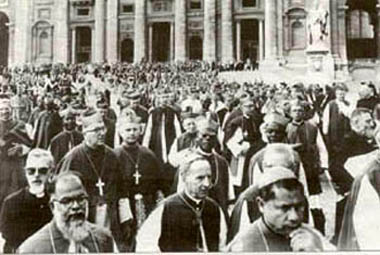Monday, December 24, 2012
THIS WEEK AT VATICAN II
DECEMBER 1962 - 50 Years Later
Pope John XXIII Named
Time 's "Man of the Year"
The opening words of the U.S. newsweekly's announcement:
The Year of Our Lord 1962 was a year of American resolve, Russian orbiting, European union and Chinese war.
In a tense yet hope-filled time, these were the events that dominated conversation and invited history's scrutiny. But history has a long eye, and it is quite possible that in her vision 1962's most fateful rendezvous took place in the world's most famous church—having lived for years in men's hearts and minds.
That event was the beginning of a revolution in Christianity, the ancient faith whose 900 million adherents make it the world's largest religion...
Thursday, December 6, 2012
THIS WEEK AT VATICAN II --
50 Years Later
December 1962
THE END OF THE FIRST SESSION
What was accomplished?
At the end of the first session on December 8, Pope John XXIII said that
“the first session was like a slow,
solemn introduction to the great work of the Council … It was necessary for
brothers, gathered from afar, to make each other’s closer acquaintance; it was
necessary for them to look at each other squarely in order to understand each other’s
hearts; and to describe their own experiences … under the most varied climates
and circumstances, so that there could be a thoughtful interchange of views on
pastoral matters.”
The U.S. Bishops’ own Council Daybook recalled this “human side of Council” – “Around 11 o’clock each morning, scenes
develop in the side aisles of the basilica which - except for the purple robes
and colored marbles - could be seen in the corridors and cloakrooms of the U.S.
Senate…Clusters of Bishops engage in animated conversation, form, dissolve,
reform with new members…in cloakroom and coffee lounge.”
During the first
session, the 2,500 Bishops got to know one another, realizing the vastness and
the vitality of Christ’s Church
throughout the world.
What wasn’t accomplished?
None of the conciliar documents was ready for promulgation at the end
of the first session. The Bishops decided that the schemata which had been prepared before the Council – for the most
part by curial officials – did not reflect the pastoral style of the Council.
One conciliar historian noted that: “The German theologian Father Josef Ratzinger
called the absence of any approved Council text before the end of the first
session “the great, astonishing, genuinely
positive result of the first session.” The fact that no text had
gained approval was evidence, he said, of “the
strong reaction against the spirit of the preparatory work.” This he called “the truly epoch-making character of the Council’s first session."
What were the plans for the second session?
That schedule was to be changed, because of the sheer magnitude of the work to be done – and because of Pope John’s failing health. After the first session, the Bishops returned to their dioceses “changed men”; when they returned to Rome, they would find dramatic changes, including a new Pope – who would commit himself to the ongoing work of the Second Vatican Council.
(Coming Next: June 1963 – The Death of Pope John, the
Election of Pope Paul)
- Monsignor John T.
Myler
Subscribe to:
Posts (Atom)





